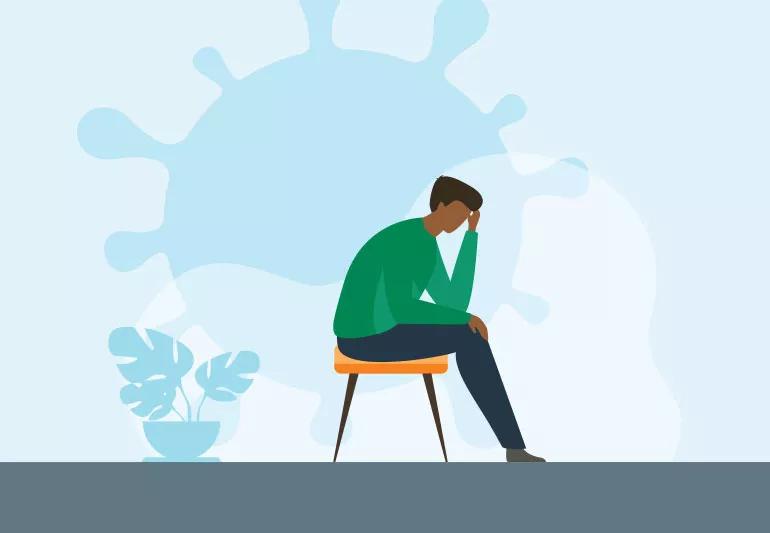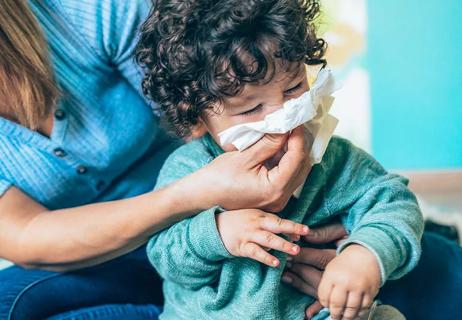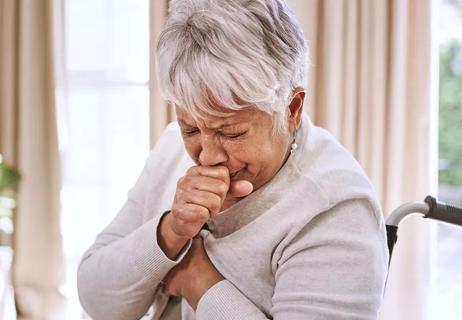Some may experience COVID-19 symptoms like fatigue for months or even a year after infection

The story of coronavirus (COVID-19) keeps evolving. Experts continue to study how and why some people may have long COVID, a condition where they experience symptoms of the illness many weeks or even months after having COVID-19.
Advertisement
Cleveland Clinic is a non-profit academic medical center. Advertising on our site helps support our mission. We do not endorse non-Cleveland Clinic products or services. Policy
While the majority of individuals who get COVID-19 end up having mild symptoms with relief from most of their symptoms in about two weeks, data shows that about 1 in 13 adults in the U.S., or about 7.5%, will have to deal with long COVID symptoms.
One of the most frustrating parts? There seems to be no consistent reason for this.
This group of individuals, which many refer to as “long-haulers,” is mixed with those who experienced both mild and severe cases of COVID-19. And this condition can affect anyone — young, old, those who were healthy, those who had a chronic condition, those who were hospitalized and those who weren’t.
“Long COVID is challenging because everyone’s needs are so unique,” says family medicine provider Christopher Babiuch, MD. “We’re finding that collaborating as a team between different specialists helps to manage and support these patients, but there’s a lot that we’re still learning.”
Dr. Babiuch explains what we know about long COVID and what kind of treatments are available.
As of right now, there isn’t one standard definition of long COVID. The Centers for Disease Control and Prevention (CDC) says that “some people who have been infected with the virus that causes COVID-19 can experience long-term effects from their infection, known as post-COVID conditions (PCC) or long COVID.”
Advertisement
“Typically, after having an active infection like COVID-19, the contagiousness goes away after a week or so and you start to recover,” notes Dr. Babiuch. “We less commonly see persistent fevers in this group, which hints that they probably aren’t infectious months later, but it can vary. Most long-haulers test negative for COVID-19, despite lingering symptoms. We define a long hauler as still having some sort of symptom 28 days or later after they were first infected.”
The range of symptoms of long COVID and what one might experience is different from person to person. Here are a few examples of long COVID symptoms:
“Perhaps the most significant symptom that is being seen across the board in coronavirus long-haulers is fatigue,” says Dr. Babiuch. “Oftentimes, this group feels very run down and tired. They can’t exert themselves or exercise, and simple tasks like walking to the mailbox will often leave them feeling exhausted. Chronic fatigue like we’re seeing in this group can be incredibly debilitating and frustrating.”
Long COVID symptoms can last anywhere from a few months to a year.
But researchers are analyzing data to determine an average window of symptoms, as well as many other factors.
“At this point, we can’t determine the average age or predict who may have long-term symptoms,” says Dr. Babiuch. “There is a mix of relatively young, healthy people who we’re seeing in this long-term group as well as older individuals.”
And it seems that the majority of those with long COVID have an underlying or chronic medical condition.
“We think that’s the case, but it’s still too early to say for sure. Our experience shows most long-haulers tend to fall into the high-risk category, but there’s also a growing percentage of people who were otherwise healthy before they became infected,” states Dr. Babiuch. “From what we know so far, it still seems random as to who experiences these long-lasting symptoms and who doesn’t.”
Long COVID shouldn’t be confused with rebound COVID, in which you test positive within days of completing your treatment.
COVID-19 starts an inflammatory response in the body, which can cause a chain of events with many different symptoms and outcomes.
“Unfortunately, more research needs to be done to help us explain why this can lead to prolonged symptoms in some people,” says Dr. Babiuch. “In the future, we’ll be able to tell the full long-term effects that COVID-19 has on the kidneys, lungs and heart, but we just aren’t there yet.”
Advertisement
Many health systems are starting to streamline care for this group.
According to Dr. Babiuch, “Long-haulers should go through testing involving behavioral, pulmonary, respiratory, cardiovascular and neurological health. From there a care path and treatment is recommended and a team of providers will monitor the patient moving forward. It’s also important to drink fluids to stay hydrated, rest, focus on sleep, manage stress and eat well.”
All this collaboration and research will lead to more data and help doctors start to piece together the long-term effects of COVID-19 on the body.
“There are teams who can identify symptoms that worsen and get you to the right level of care,” says Dr. Babiuch. “We’re also seeing that depression and anxiety are big issues for these long-haulers, so checking in to see how they’re doing is another important aspect in the monitoring program.”
And if you have long COVID, it’s recommended that you still get vaccinated and boosted.
“The CDC has recommended that the vaccines shouldn’t be withheld from those with a prior infection of COVID-19, regardless of being symptomatic or asymptomatic,” explains Dr. Babiuch. “If you’ve tested positive for the virus (or believe you had it), you’ll need to wait 10 days or until you are no longer showing symptoms to receive the vaccine.”
Advertisement
Advertisement
Learn more about our editorial process.
Advertisement

Kids under 4 shouldn’t use cough and cold medicine — older kids may or may not benefit

A couple essential oils may be used with caution, but there are safer and more effective options

Germ-killing chemicals in the water can lead to respiratory issues

Sneezing, coughing and clear mucus shouldn’t be ignored

Taking a warm shower before bed and drinking warm liquids throughout the day can help

The natural at-home remedy can soothe irritation and decrease inflammation

Steam, cold air and extra snuggle time can help manage that seal pup bark

When to be evaluated for a cough that won't improve

Type 2 diabetes isn’t inevitable with these dietary changes

Applying a hot or cold compress can help with pain